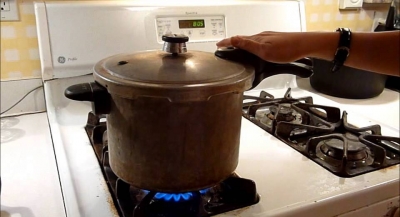
When you boil potatoes in a saucepan, they take 20 to 30 minutes to cook. But boil them in a pressure cooker and they will be ready in 4-5 minutes. Why?
In a saucepan water boils at 212°F (100ºC). No matter how much you heat the water, the temperature can never go any higher. It just turns into steam.
But a pressure cooker has a sealed lid, so steam produced when the water boils builds up inside. As the pressure rises, so does the boiling point of the water. The cooking temperature is therefore increased, which reduces the time needed to cook the food.
The domestic pressure cooker evolved from a steam digester patented in Britain by a French physicist, Denis Papin, in 1679. A typical modern cooker operates at an extra pressure of about 15lb per square inch (1kg per square cm), or at about twice normal air pressure. So the water boils at 252°F (122°C).
The pressure cooker has a saucepan like base and domed lid. A rubber gasket between the two ensures a pressure tight seal. In the centre of the lid is a vent in which a weight is pleased. The weight seals the vent, but lifts when the steam inside reaches the required pressure. Rings can be added or removed, giving the cook a range of temperatures. There is also a safety plug in the cover, which releases the pressure if the weight fails to rise.
Picture Credit : Google

